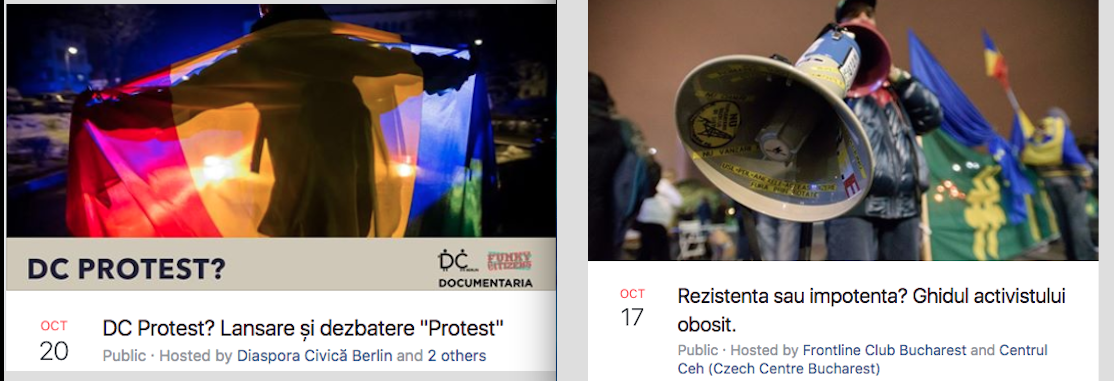The online book that Darren G. Lilleker and I have edited and published this June analyzing the #rezist anti-corruption protests in Romania has given us numerous opportunities of reflection.
Protest PR and the future of civic activism in two events
Ghildul activistului obosit (The guide of the fatigued activist) debate in Romania, organized by Frontline Club Bucharest, brought together a former minister of health (Vlad Voiculescu), an activist (Catalin Tenita) and a former journalist (Oana Dobre-Dimofte) moderated by another journalist, Andrei Gheorghe.
https://www.facebook.com/FrontlineClubBucharest/videos/1588036637886513/?hc_ref=ARRcn82h6WrbB1EjVPQPbL4DtVmv1nVLFlUVLm_1VK-b0zodJovcq39UVAgtGmVvrxk
The event in Berlin – DC Protest – was organised by Diaspora Civica Berlin (a group that has formed after the #rezist protests), Documentaria.ro and Funky Citizens. Cosmin Pojoranu from Funky Citizens, Bogdan Dinca from Documentaria.ro, Ioana Dragos (member of Diaspora Civica Berlin) and Cristian Dragnea (activist and philosopher) and I were moderated by Alexandra Ioan (also a member of Diaspora Civica Berlin and a contributor to our report).
https://www.facebook.com/monica.moisin/videos/10155722232930070/?hc_ref=ARSwLGTG-77Y3FZNBJatO7Povv5Zx1FRSs5PlPBz4IlSrW4YYCgdAwVjLV3oUwQVnBE
Three major questions
The essence of both events for me can be found in three questions:
- Were the protests successful?
- How can activists continue to enact the change desired?
- How can activists facilitate dialogue and work with audiences that might have different views/goals than them?
Were the #rezist protests successful?
In my view, the short answer is yes. In fact, all the protests that took place in Romania from 2007 onwards have achieved their short-term goals. My interview with Deutsche Welle explains this more fully and so does Cosmin Pojoranu’s article in our report.
How can activists continue to enact the change desired?
The feeling of dissatisfaction and tiredness was obvious both in Bucharest and Berlin with participants at the debates suggesting that they do not feel that they are making much progress. As a consequence, they were questioning the effectiveness of their protests. This soul-searching and questioning is not unique to the Romanian #rezist movement: the article of Immanuel Wallerstein which we reproduced in the report speaks something similar happening in the USA.
Protests are the equivalent of emotional outbursts and they are successful when that energy can be focused towards actions that can be made immediately and have either immediate or short-term effect.
Civic activism (and the collaboration between civic groups) is the solution to the long-term changes that the participants at the panel were mentioning; and so is managing expectations. This is perhaps the best seen in the history and beginnings of any big, international activist group. Civic activism, however, to be successful, needs to be cause-/area-specific. Beyond this, to affect politics and policies, one needs to engage more fully with the political processes.
How can activists facilitate dialogue and work with audiences that might have different views/goals than them?
This was inspired by the article written by Bianca Cheregi and Dumitru Bortun on the “two Romanias” and their different and at times, incompatible values and by the feeling of the participants at both panels that they were too often preaching to the converted (something that social media facilitated all too well).
The answers provided by the two panels mentioned education, transparency, and communication: that is educating different groups about various initiatives and how they are relevant to them (one example used was that of youth “playing” city hall as a means of understanding local politics), requiring a higher level of transparency/disclosure from politicians, organisations, institutions and corporations alike and trying to get involved in activities that would enable people to go beyond the perceived border of “the other”.
I would just add, that one needs to remain rather specific in its objectives and seek partnerships that can help achieve them and/or reach other people. Successful activism I believe is community specific, is visible and palpable locally.
Protest PR for corporations – some further reflections on #rezist – Romania’s 2017 anti-corruption protests: causes, development and implications
Darren and I wrote for The World Today (Romania`s resistance)Â giving an overview of the protests and movement that they generated. Our writings for the Institute for PR, the European Association of Communication Directors and Communication Director Magazine however focused mostly on what can PR/corporate communicators learn from protests.
- Five Lessons in Effective Communication from the #Rezist Romanian Protests
- Reflections on the Romanian #rezist protests and the EACD Manifesto against fake news.
- The postmodern PR practitioner: activist and communicator.
